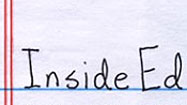For the fifth year in a row, Maryland has the best public school system in America, according to rankings published Thursday by a leading education publication that gave the state high marks for post-graduation outcomes, state funding levels and overall student achievement.
In the report card published annually by Education Week, the state was issued an overall grade of B+, compared to the nation's overall C+, after an assessment of six areas that examined education policy and performance.
Maryland received its highest marks, A, for its emphasis on early-childhood education, and preparing students for college and work.
Gov. Martin O'Malley, whose tenure has coincided with the five-year streak, said the ranking reflects his administration's focus on education and jobs, and "the better choices that we've been making as a people to have better education in Maryland."
O'Malley said he was proud of the state's perfect scores of 100 for school and work-force preparation programs, and said the move to offer full-day kindergarten, required by state law in 2002, has been the most effective iresult of increased allocations to districts under the state funding formula. According to the state's Maryland Model for School Readiness, which assesses whether students have the academic and social skills to succeed in school, the state has seen a 38 percent increase in the number of students who enter kindergarten prepared.
O'Malley also lauded school districts' embracing of programs that award industry-recognized certificates in high school, and said he would like to see such offerings expanded.
"We always want to do better," O'Malley said, adding that he would like to see more innovative approaches, such as online learning, explored. "Being No. 1 in the country isn't good enough because our kids are competing in a global economy."
The state's achievement levels in grades K-12 earned a B, ranking it third in the nation, and the state also posted high marks for educational standards and accountability for schools. Maryland also received high scores for how well, and how equitably, it funds schools.
"The fact that Maryland is No.1 is no accident," State Superintendent Lillian M. Lowery said in an interview. "We have a governor and a General Assembly who really put education as their top priority, and that is seen through the policies and the funding. Even through bad times, our elected officials make sure our schools are funded."
The lowest scores issued to the state were a 76.5 for "accountability for quality" of its teaching force and 78.3 for the quality of its assessments. The state's assessment score trailed the national average score of 83.3, while the state's score for teaching quality compares to the nation's score of 74.5.
However, both areas are about to be overhauled. This fall, the state will introduce a system that ties 50 percent of an educator's evaluation to student achievement. And the state will soon implement a new, more rigorous curriculum, called Common Core Standards, that will require new assessments.
Lowery likened the Education Week report card to the state's own accountability measure, the School Progress Index, which measures improvement over time and targets specific benchmarks.
"We're competing against ourselves, and we are either sustaining proficiency or getting better," Lowery said. "It gives us great data on where we need to target our efforts. We want to have all A's."
On Thursday, O'Malley visited Jones Elementary School in Severna Park, where teachers let the students out of science and social studies classes to listen to the governor praise Maryland schools.
"There is no more important work being done in the state," O'Malley told about 50 fifth-graders waving orange No. 1 foam fingers.
House Speaker Michael E. Busch said the reason the state was No. 1 five years in a row was because the governor choose to invest in education.
O'Malley said more work needs to be done to ensure Maryland high school students succeed in college and to close achievement gaps. He said his budget plan, to be unveiled next week, will have education proposals that address those goals and increase "digital learning."
"A high school degree isn't worth very much if you can't succeed in your first year of college," O'Malley said. "That work continues. The No. 1 rankings are annual snapshots, but it's certainly not the end of the work that have to do."
This year's Education Week report also included a companion survey — not factored into the states' rankings — polling educators on other factors pertinent to achievement, such as school climate, discipline policies and safety.
Teachers and administrators ranked school safety third out of five factors that are important to student achievement, behind teaching quality and school climate, and ahead of school discipline policies and family background. Educators also said they favored in-school suspension as the most effective disciplinary measure; and those in low-poverty schools said they felt more safe, and responded more favorably about their school climate, than those in high-poverty schools, by a sizable margin.
As has been the case in previous years, Massachusetts ranked a close second to Maryland in the national rankings, with a grade of B. New York, Virginia and Arkansas rounded out the top five school districts in the nation. South Dakota, Nevada, and Idaho were ranked the lowest.
erica.green@baltsun.com
twitter.com/EricaLG
Sun reporter Erin Cox contributed to this report.







